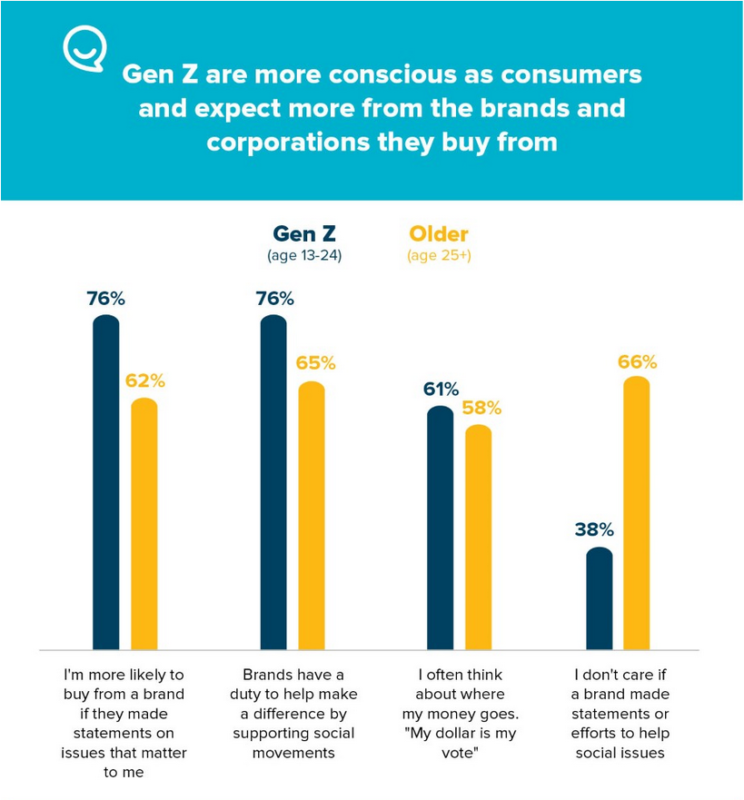In early June, activists in the music industry organized Blackout Tuesday to raise awareness for systemic racism. The idea was to put businesses on pause just for one day to make space for conversations on how to support the Black community. While the effort got a lot of traction, it also inadvertently drowned out Black voices as millions of users posted photos of black squares on Instagram using the #BlackLivesMatter hashtag.
Brands got in on the action as well. One study estimated that almost 1,000 brands (including Mercedes-Benz, Netflix, Disney, Apple, Spotify and Nordstrom) participated.
The Black Lives Matter movement demonstrates how brand activism has become mainstream. Once the exclusive domain of super progressive brands, commenting on social issues is now expected from most global companies. But these efforts come with intense scrutiny—consumers, rightfully so, are often sceptical of the authenticity of statements from brands. Are all of these efforts simply performative, or do they actually help advance a cause?
In a recent study on social activism, Reach3 Insights found that Generation Z consumers have high expectations when it comes to how brands insert themselves in social justice movements. We conducted the study in July 2020, using a mobile messaging-based, conversational technique that leveraged software from our sister company Rival Technologies. The study engaged 495 research participants, a large chunk of which included 16- to 24-year old Gen Zs.
Voting with their dollars
One of our bigger takeaways is how Gen Z consumers are more likely than their older counterparts to support companies whose values align with theirs. Gen Zs are conscious consumers who understand that their purchasing habits can help propel positive change.
Sixty-one percent of Gen Zs said they often think about where their money goes because “my dollar is my vote.” Three-quarters (76%) of Gen Z are also more likely to buy a brand’s product or service if they have made statements on issues that matter to them, while only 62% of those 25 or older agreed with the same statement.
To make a meaningful connection with Gen Zs, global brands will need to consider being more vocal about social issues. But how do you do so genuinely? Our study uncovered a few things Gen Zs are specifically looking for from brands.
A clear statement on where you stand
Compared to older consumers, Gen Zs are more likely to expect corporations to make a positive contribution to society. At the very least, these young consumers want brands to make statements.

Silence is not an option. While 66% of non-Gen Zs said they don’t really care if a brand makes a statement about a social issue, only 38% of Gen Zs agreed with the same statement.
For brands, the implications are clear and significant. For big social issues such as race relations, Gen Zs expect companies to make their positions clear and to use their power to influence positive change. Of course, this is not an easy task: it requires companies having clarity on their own values and making a commitment to stand for what they believe in. In recent years, we’ve seen big companies such as Procter & Gamble and Salesforce embrace a more values-driven approach to conducting business. Global brands need to follow the same journey if they want to win the business of Gen Z consumers.
Say it in a way that’s unique to your brand
A generic statement is almost as bad as saying nothing. Our research shows that the most resonant brands are those that have gone above and beyond canned responses. Statements need to feel specific, differentiated and authentic to your brand.
When asked about which brand statements resonated with them and why, research participants singled out companies that took a unique approach to showing their support for the Black Lives Matter movement. “With some brands it doesn’t feel genuine, like they are just posting that to prove that they are supporting but aren’t taking the proper actions,” said a 17-year old woman from Michigan. “Though a few, such as Nickelodeon, have come out with meaningful statements.”
A 16-year-old woman from South Caroline explained further, saying, “Nickelodeon stopped all shows for eight minutes I believe and other brands I follow on Instagram have posted about it.”
More than any other brand, Nike garnered the most praise for their statements in support of BLM through viral initiatives such as the “Don’t Do It” campaign. “Nike, saying how they stand with BLM, made me feel good to know that they support us,” said one 17-year-old Black man from Illinois.
Go beyond “woke” performative statements
Beyond a clear statement, Gen Zs want to see meaningful action and consistency. A single action won’t do—Gen Zs are looking at a company’s entire history and all aspects of their business.
To illustrate this point, it’s worth looking at Nike once again. “I think it was Nike or something, but we all know they don’t care, they just do it for the money,” mentioned a 17-year-old Black woman from Arizona. Another participant from New York, added, “They talk social justice while having kids in Asia make slave wages.”
Taking short-term actions like shutting down business for a period and donating profits are a good start—but Gen Zs want more. Making donations long term or recurring, proactively making or changing relevant products, hiring more people of colour, and incorporating these ideals directly into the brand identity are stronger indicators of actionable change that resonate with consumers.
A 14-year old white man from Maryland said he appreciated Band-Aid’s decision to create a line specifically for people of colour. “This made me happy, since I think that it’s important to raise awareness of the BLM cause and by being part of the change, I am more likely to purchase from that brand.”
Perhaps no brand has interwoven unique messaging with meaningful action as consistently and intentionally into their brand identity as Ben & Jerry’s. The ice cream company has embraced corporate activism way before it became cool. “Ben & Jerry’s sometimes does a short little post about the injustice of prisons and stuff like that,” said one 22-year-old Black man from Ohio. “I tend to agree with the things they post.”
A 17-year-old white woman from North Carolina added, “Ben & Jerry’s has done a lot for Black Lives Matter and other movements. They have donated and spoke out against racial injustice and even made an ice cream for it! I believe that all companies should do the same.”
Conclusion
While Gen Zs aren’t necessarily expecting CEOs to get arrested on the front lines of protests, these young people also expect more than black-square photos and generic statements. In today’s politically charged environment, Gen Zs think corporations have an important role to play.
It will be interesting to see how Gen Z’s sentiments towards brand activism will change over time as they become older. In many ways, Gen Z’s idealism is not surprising or unique—throughout history, it’s the younger generation that has demanded change from politicians and companies. What is different about Gen Z is that as the first true digital natives, they are using technologies and apps like TikTok and Instagram not just to learn about different social justice issues, but also to make meaningful contributions to the causes they care about. This is a generation that’s discerning of what they see: winning their trust—and their business—requires real, meaningful action again and again.


